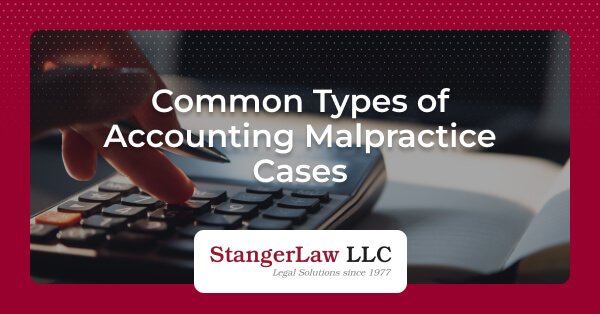Common Types of Accounting Malpractice Cases

The practices involved with filing taxes, investing money, handling business finances, or managing an estate are often complex.
This is why many of us hire accountants to handle our financial affairs. But what happens when an accountant does something that causes you harm?
You may wonder, Is my accountant or the other persons accountant responsible for mistakes? Depending on the facts of your case, you may have an accounting malpractice or fraud claim.
Generally, accountants may face accounting malpractice cases or simply be liable when they commit wrongs, make harmful mistakes, commit fraud, or otherwise negligently handle the financial information of their clients.
Before you run to the courthouse to confront your accountant, speak to a knowledgeable attorney about the details of your situation.
At StangerLaw LLC, our legal team is experienced in handling accounting malpractice cases, and we can help you.
Call (860) 561-0651 or fill out our online form today to request a consultation.
Our Practice is Limited to Connecticut
We handle two types of accounting malpractice claims (6 figures+):
- Claims for penalties and interest caused by failure to pay taxes due to accountant or attorney malpractice (we do not seek recovery of unpaid taxes that were rightfully owed).
- Claims for taxes wrongly paid due to accountant negligence, but only if the deadline for filing an amended return has passed.
Common Types of Accountant Malpractice
Accounting malpractice comes in many different forms that can wreak havoc on your legal or financial well-being.
There are different types of accountants, for example your claim could be a CPA malpractice claim or a malpractice complaint against a tax accountant.
Common types of accounting malpractice cases include the following:
- Accounting negligence cases,
- Breach of contract cases,
- Accounting fraud cases, and
- Breach of fiduciary duty cases.
Whether you can file a case depends on your relationship with the accountant and the relevant legal standards.
Accounting Negligence

When someone is negligent, it means that they have breached a duty of care owed to someone else and caused harm with their breach.
An accountant owes their clients a duty of care of a reasonably prudent accountant. If they breach this duty, they can be held liable for negligence.
Accounting negligence can occur when an accountant does not accurately analyze and calculate the information the client hired them to handle.
Negligence can also occur when an accountant violates one of the Generally Accepted Accounting Principles (GAAP) or Generally Accepted Auditing Standards (GAAS) that apply to their profession.
Suppose your accountant fails to present accurate information about your financial position. In that case, you might have a legal claim on your hands.
However, GAAP standards require you and your accountant to present each other with honest information. So if your accountant makes mistakes because you did not give them all the information they needed for their work, they might not be liable for your damages.
Breach of Contract
You hire an accountant for a specific purpose. If your accountant does not fulfill their contractual obligations, you can sue.
However, you should have an attorney review your contract before you start a lawsuit. This helps ensure that your breach of contract claim is appropriate and actionable.
Accounting Fraud
Sometimes professionals lie. If your accountant or someone else’s accountant has lied to you in hopes of obtaining a benefit, they are likely guilty of committing fraud and could be civilly and criminally liable for their actions.
Accounting fraud can take many forms, such as misrepresenting financial statements, not recording revenue, overstating or understating assets, or manipulating the numbers to project an inaccurate financial appearance.
Breach of Fiduciary Duty
Some accountants owe their clients a fiduciary duty. This means that some accountants owe duties of loyalty and honesty to their clients.
This duty often arises when an accountant is hired to manage a trust, an estate, or investment matters. Fiduciaries should handle your assets in a way that benefits you, prevents waste, and helps you avoid legal liability. If your accountant unreasonably fails to do this, they could be liable to you.
Not every accountant you hire is your fiduciary. The main job of some accountants is to present an accurate report regarding your assets and liabilities.
This is true of accountants who prepare your taxes, handle your payroll, and compile reports for your investors. In this case, they owe you the regular duty of care as any accountant and possibly not the special fiduciary duty.
Contact a Connecticut Accounting Malpractice Lawyer For Help
At StangerLaw LLC, we are passionate about protecting the Connecticut community from professional malpractice, including accounting malpractice. When a professional betrays you, we can champion your rights.
Bruce H. Stanger has more than 40 years of experience. He is dedicated to providing clients with quality legal services.
Our firm works hard to keep the lines of communication open with our clients. Call (860) 561-0651, or contact us online to request a consultation.